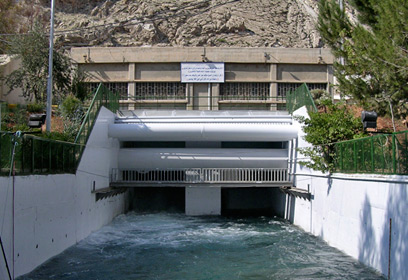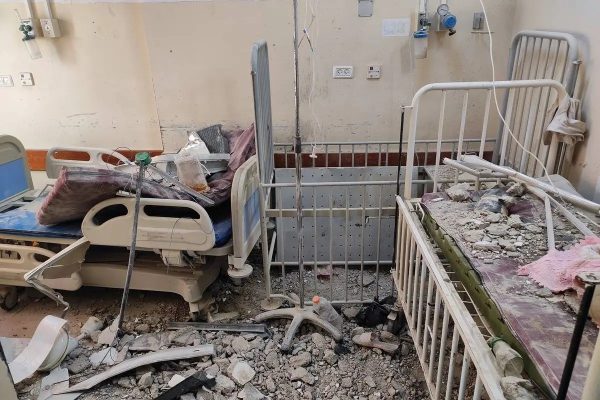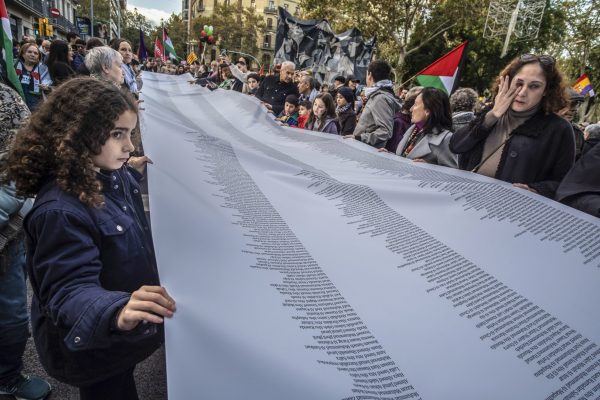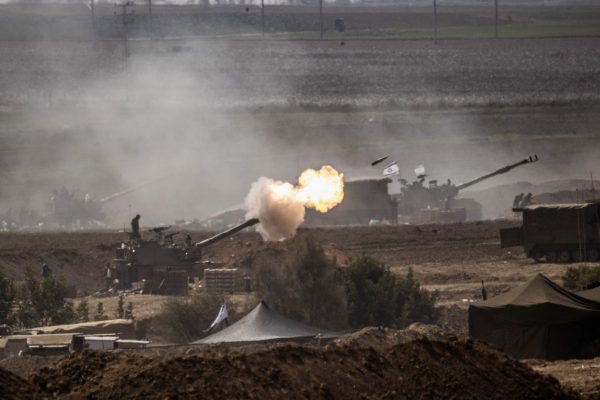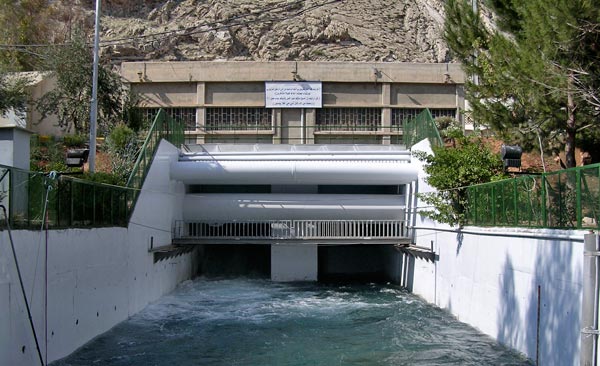
In this 2007 photograph, water runs easily through the spring in Ain al-Fijah, Syria. More recently, rebel fighters have been shutting it down to deprive Damascus. / Photograph: Shadi Hijazi
When Mohammed and his family entered the Abu Waheed restaurant in Ain al-Fijah, a village cradled in the mountains of southern Syria, they were the only customers. It was June of 2012, just a few months into Syria’s revolution. One year earlier, obtaining a reservation at the restaurant would have taken days.
“It was one of the most famous restaurants in Syria, even President Bashar Assad used to go there,” the water engineer from Damascus told me in a call from Turkey, where he fled a few years ago amid threats from the Syrian regime. He asked to be identified only by his first name.
The empty restaurant foretold the fate of Ain al-Fijah in Syria’s protracted war. Poking out from the tall grass and apple orchards of Syria’s Wadi Barada region, about fifteen miles northwest of Damascus, the village of six thousand was once a favorite among weekenders. Its restaurants offered seats on the edge of the cold spring, an ancient water source that today supplies some four million in and around the capital.
But by spring 2015, Ain al-Fijah had become a ghost town, marked by crude barricades and rebel checkpoints, and its water had been weaponized. In the deadlocked fight between the regime and insurgents, Ain al-Fijah represents a kind of nuclear option: cutting its flow parches Assad’s stronghold, but the cost to civilians—and the rebel cause—can be huge.
• • •
Ain al-Fijah’s rebel takeover was swift. By November 2011, soon after demonstrations beginning in the southern city of Daraa spread as far as Homs and Aleppo in the north, Ain al-Fijah was already raging. Many residents took up arms and joined the Free Syrian Army (FSA), an insurgent group with a nationalist vision.
Mohammed said street protests became more violent after dark, with armed civilians wresting control from police and civil workers. Two months later, the village had been declared “liberated” from Assad. At the time, it represented minimal gains for the rebels. But the territory, and its water supply, would end up defining their fight against Damascus.
Control of the spring meant rebels had the ability to shut down its flow entirely—and with it, much of the capital’s water supply. Snowmelt feeds freshwater into a small pumping station in the basin village. From there, it travels about ten miles by pipeline to a government-controlled facility on Mount Qasioun, where it is pumped back downhill to fourteen villages across the region and finally to Damascus.
‘The rebels say they’ve laced the spring with TNT and explosives.’
Since government forces withdrew from Ain al-Fijah at the beginning of 2012, the FSA has taken advantage of this position. Abu Muhammad al-Baradawi, a media activist in Ain al-Fijah, told me over Skype that the rebels’ largest victory came in November 2014, when Syrian ground forces were repelled from Wadi Barada’s villages after the FSA cut the water supply. “The water from Ain al-Fijah was shut off for three days,” he said. “The government was forced to answer to their demands, which usually includes prisoner releases and the withdrawal of government troops.”
Rebels last shut off the spring in August 2015. Opposition factions were locked in battle with government forces and the Lebanese Shia group Hezbollah in the area around Al-Zabadani, some nine miles northwest of Ain al-Fijah. Baradawi said a few hundred rebels left the village to join FSA brigades and al-Qaeda linked Jabhat al-Nusra fighters. At home, the village rebels shut off the spring’s pumping station, slicing the water output to Damascus by 90 percent for three days.
To some degree, it worked. A handful of prisoners were released and an official cease-fire took hold shortly after. In Damascus, water shortages and rationing sent residents into a panic, especially as rumors circulated about a rebel threat to bomb the spring and destroy the supply for good.
Abeer Pamuk, a media officer for the Damascus-based SOS Children’s Villages in Syria, told me in a phone call from the Syrian capital that water shortages lasted for two chaotic weeks there. “It was a nightmare, people in Damascus kept saying ‘we are going to be like Aleppo,’” she said.
Syrians know the desperation implied by her comparison. Aleppo, the largest city in the country’s north, experienced a water catastrophe last June when fighters from Jabhat al-Nusra bombed the main pipeline carrying water from the Euphrates to the city. Residents are still feeling the effects. “The first time [after the explosion] trying to pump water back was the worst,” Pamuk said. “The sanitation water got mixed with the drinking water—you turn on the faucet and real shit-water would come out.”
More than a hundred people were poisoned by water that summer, and the city’s pumps shut down entirely for thirty-one days. Makeshift wells helped for a while, but groundwater was increasingly overwhelmed.
• • •
The water wars in Ain al-Fijah have so far been less disastrous. Tanks in the government’s Mount Qasioun facility collectively store fifty thousand cubic meters, according to Mohammed, while groundwater gets pulled from wells in and around Damascus. But while backups exist, they don’t last forever. “This is the only place in Syria where so many people depend on one source,” he said.
Each time rebels have shut off the water supply, they have restored it within a few days, according to Baradawi. He says this is partly because the spring also supplies the Wadi Barada villages along the road to Damascus and opposition-aligned neighborhoods inside the capital. Moreover, the rebels receive a major blow when government forces inevitably retaliate.
“For two days [after the shutoff] the regime was hitting Ain al-Fijah with heavy shelling, dropping barrel bombs and mortars and sending snipers into the mountains,” he said. “Entire buildings were hit with families living in them. It was really barbaric, and it turned the people against the FSA.”
Even after the water flowed again in Damascus, the regime continued to punish Ain al-Fijah. In August, Assad’s forces ordered a blockade, causing garbage services, electricity, and traffic from the capital to cease. Baradawi said only 150 or so students and government workers with business in Damascus were allowed to exit or enter the area; they were prohibited from carrying food and fuel back inside.
“People have started eating leaves,” Baradawi said when we spoke in November. “All the people want now is to find a student going to Damascus who can buy one potato. A kilo of sugar is a dream.”
The blockade also prevents chlorination of the water pumped back to Wadi Barada from the station on Mount Qasioun, sparking a host of sanitation concerns. Cholera and Hepatitis A are currently on the rise as families use untreated water to drink and cook food. Local doctors have documented some three hundred cases of stomach illnesses since the blockade began.
“We can say the regime 100 percent won this one,” Baradawi tells me in resigned tones. The blockade has been so effective that, he believes, residents no longer see the spring as a useful bargaining chip.
• • •
Last month Ain al-Fijah itself was experiencing water shortages. Baradawi thinks that government workers in the Qasioun facility were deliberately blocking the line back to Wadi Barada. “We are known as a very small village that gives water to millions, yet for more than fifteen hours a day we don’t have water ourselves,” he complained. “It’s been this way for twenty days.” According to Pamuk, the capital was also suffering shortages in November. Government forces and FSA rebels blame each other.
That is to be expected in this tit-for-tat. But the rebels do have a trump card, if they are willing to play it.
“The rebels say they’ve laced the spring with TNT and explosives, and that if the army enters again they will explode the spring and let everybody lose,” Mohammed, the water engineer, says. “And the regime is very scared of this because they know that if the rebels get crazy, they get really crazy.”
When asked whether rebels would really destroy the spring, Mohammed hesitates.
“If you are in a battle and you are surrounded, you kill yourself, because it’s better than being killed by others,” he says. “But this is only when there is no other way.”
